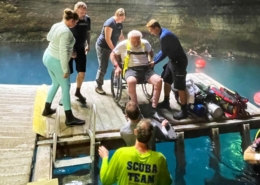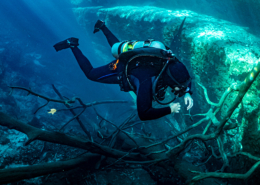Why Scuba Diving with a Buddy Is Necessary for Beginners
By: Kate Lillie
Buddy diving – is it really that important as a beginner? The short answer is yes, of course. As a diver, the buddy system is extremely important and useful. Whether a diver is diving with a newly certified diver or an experienced diver, the buddy system offers plenty of benefits to both parties. The system helps a diver to practice the traits of a good buddy such as buddy checks. This system allows the divers to learn from each other, practice the concept of two being better than one, give assistance, and to share the experience. The most imperative reason for the buddy system is that a diver should never dive outside of their training. That being said, a diver looking to dive alone would need to have training and be certified as a solo diver.
Tools
A valuable tool for a new diver’s progression in their dive skills is to learn from a buddy. This can either be with a new diver like themselves or with an experienced diver. Learning from a new diver helps the pair to learn how to be a better buddy. This can be through repetitive pre-dive buddy checks or being conscious of where they are underwater in relation to their buddy. On the opposite end of the spectrum, being paired with an experienced diver helps the novice to better their underwater skills through observation. It’s possible that during their course, the novice had trouble becoming neutrally buoyant. Observing an experienced diver being neutrally buoyant underwater can help in that skill progression. Aside from learning from a buddy, the concept of two heads being better than one is also learned through the buddy system.
Navigation
Regardless of skill level, all divers will continuously run into new challenges of diving such as navigation. If a new diver were to be diving alone in visibility conditions that were less than ideal or during a night dive, navigation could become quite difficult, even with the use of compass skills. A buddy team would be able to plan ahead for various types of conditions and work through any problems they may have during the dive. A solo diver can do the same; however, for new divers or divers who are still working on bettering their skills, a buddy team allows the team to work together on challenges the encounter. Other challenges could range from a new diver being a little nervous about diving in current or losing a light during a dive. In both cases, a buddy team could work together to get through the challenge as well as learn from it. Aside from the extra set of eyes a buddy team has, there is also a level of comfort that comes with the team. The team can rely on each other and make one another feel more comfortable in the underwater environment while a solo diver must rely on their own skills that they have learned and developed over the years.
Imagine being a new diver and getting to go on a dive in California to visit the kelp forests for the first time. Now, consider some of the problems a diver could run into having never been in that kind of environment before. Problems such as entanglement could be resolved quickly with the assistance of a buddy. Even in a learning environment, a novice diver can bring up instances where the help of a buddy would be necessary. A diver could be overwhelmed and excited about earning their open water certification and neglect to pay attention to their air consumption. In an event like this, having a buddy there would help on multiple levels. Either member of the buddy team will have had the training to consistently ask one another what their pressure is so that the emergency situation of running out of air won’t happen in the midst of all of their excitement.
Know your limit
During an open water course, or any course really, a big point that instructors should make is that a diver should not go beyond their training limits. Although there aren’t scuba police watching your every move underwater, going beyond your scope of experience can be dangerous without the proper training. This is more relevant than ever when it comes to diving without a buddy. The crucial reason for the buddy system is that a diver should never dive outside of their training. They should gain more experience and develop their skills before considering diving alone.
Not only can a buddy help with the above reasons, but diving is all about the experience and adventure. Part of that adventure and experience is being able to share it and talk about it with their buddy as well as other people. As divers, we like to look back on what we have seen and done over the years. Personally, being able to reminisce with a buddy about what we saw and experienced is part of why I continue to dive. It’s fun to talk about and plan more dive trips with my dive buddy to share more experiences and adventures underwater.
Buddy diving is a necessary tool for a diver to progress in their skills not only as a dive buddy but also in their personal skills. They can accomplish this through diving with a more experienced buddy as well as practicing buddy diving with another novice diver and learning from each other. Buddy diving also allows for a buddy pair to always have someone there to provide assistance if needed. With anything new or challenging in any sport or activity, two heads are better than one. The buddy system helps to build the team mentality that novice diver as well as experienced divers need if they want to progress their diving career or if they are diving in a new place. With any dive, both experienced and novice divers need to remember to stay within the scope of their training so that they minimize their risk underwater.










Ostavite odgovor
Želite li da se priključite diskusiji?Slobodno popunite!